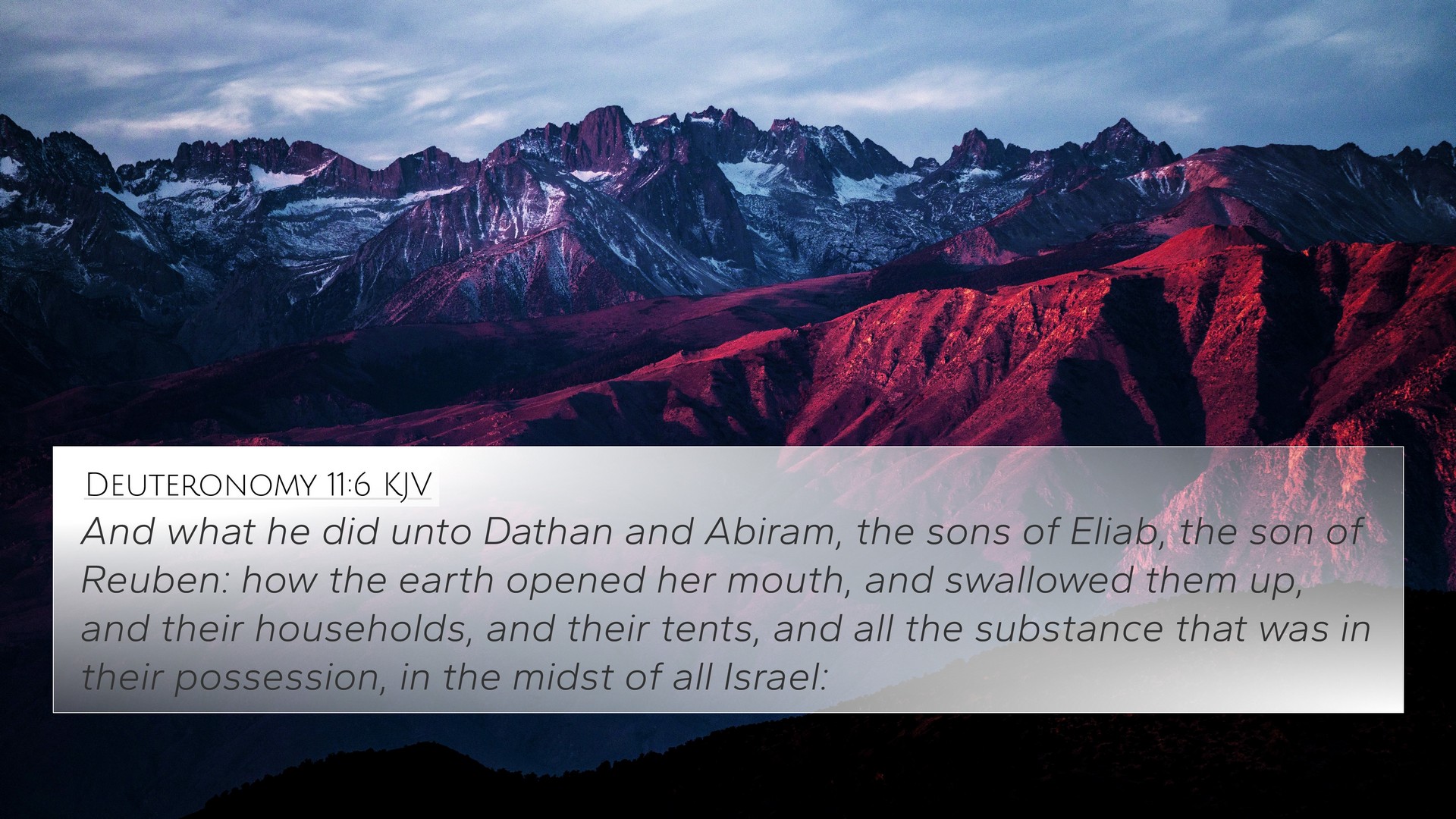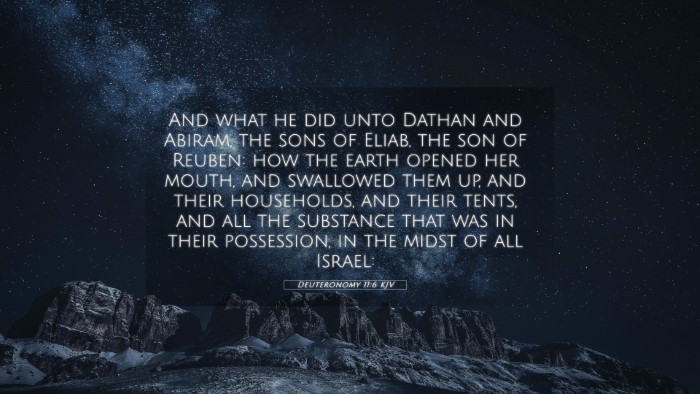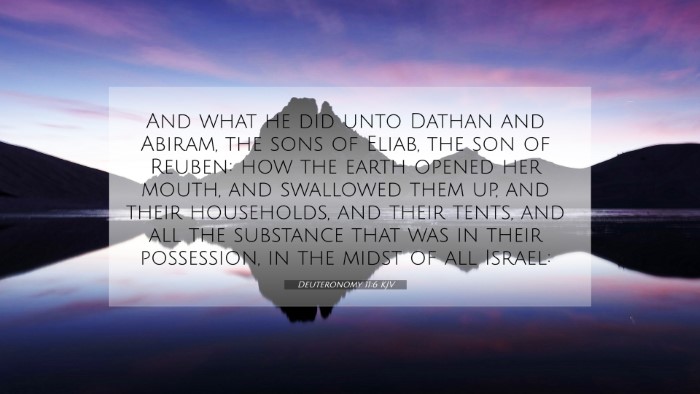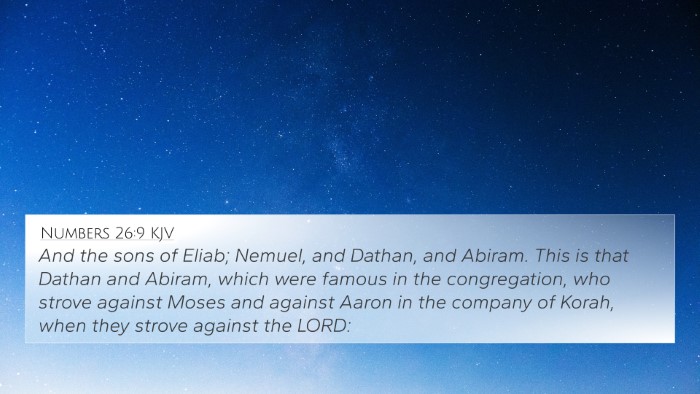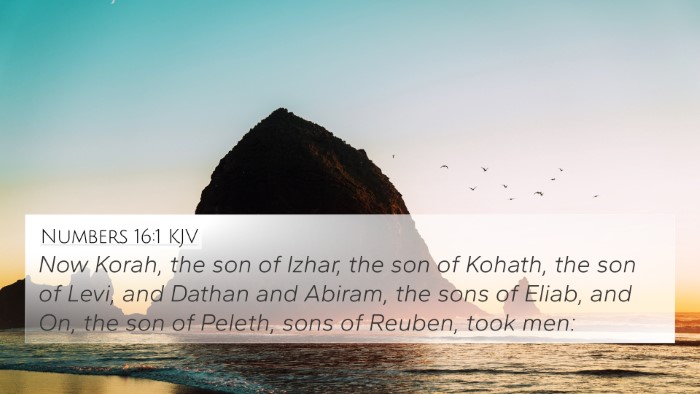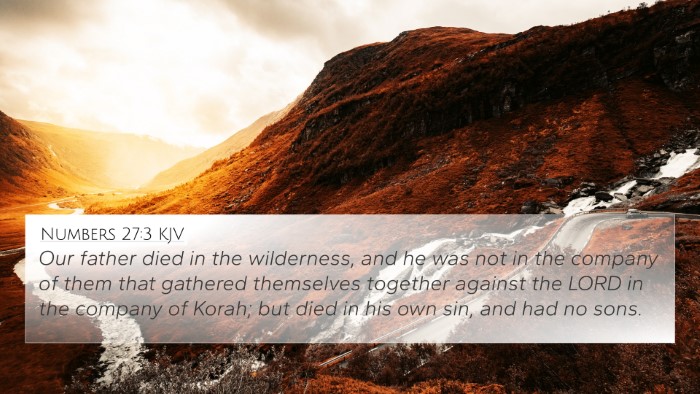Understanding Deuteronomy 11:6
Deuteronomy 11:6 states:
"And what he did unto the sons of Korah, how the earth opened her mouth, and swallowed them up, and their households, and their tents, and all the substance that was in their possession, in the midst of all Israel."
Summary of Interpretation
This verse serves as a reminder of the consequences of rebellion against God. The narrative refers to the dramatic judgement upon Korah and his followers, emphasizing God's holiness and justice. The verse is part of a larger exhortation by Moses, encouraging the Israelites to obey God's commandments and recollecting past events that demonstrate God's power and willingness to discipline His people.
Commentary Insights
-
Matthew Henry:
Henry emphasizes that this event showcases God’s retributive justice. The fate of Korah and his companions serves as a historical warning to Israel about the peril of dissent against God's chosen leaders and the divine authority.
-
Albert Barnes:
Barnes remarks on the significance of remembrance in spiritual life. He posits that recalling God's past dealings encourages faithfulness in the present. The reference to Korah calls for reverence and acknowledgment of the consequences of willful disobedience.
-
Adam Clarke:
Clarke reflects on the broader implications of God's judgement, suggesting that it illustrates His sovereignty and the importance of humility before Him. The earth swallowing Korah is a metaphor for the ultimate resolution of God's authority against human pride.
Cross-References for Deuteronomy 11:6
This verse connects to several other biblical narratives, highlighting thematic continuity throughout scripture. Below are notable cross-references:
- Numbers 16:31-33: The account of Korah's rebellion and its immediate consequences.
- Jude 1:11: A New Testament reference to Korah, illustrating the enduring lessons from his story.
- Hebrews 10:31: The fear of falling into the hands of the living God, akin to the punishment seen in Korah's case.
- Proverbs 16:18: Pride precedes destruction — relevant to Korah’s motive.
- Romans 11:22: The goodness and severity of God — reflecting his justice seen in Korah’s judgement.
- Psalm 106:16-18: A retrospective on the rebellion of Korah and the divine response.
- Exodus 32:26-28: Another rebellion episode showing God's swift judgement upon covenant breakers.
Thematic Connections
Deuteronomy 11:6 can be seen as part of a larger conversation about obedience, authority, and God’s justice throughout the Bible. Here are some connections:
- Obedience to God's Commandments: The emphasis on remembrance encourages adherence to God's laws (Deuteronomy 5:29).
- Consequences of Rebellion: The fate of Korah serves as a warning against disobedience, echoed in multiple scripture passages (Galatians 6:7).
- God’s Sovereignty: The event underscores God’s ultimate authority, a theme prevalent in both the Old and New Testaments (Isaiah 45:7).
Conclusion
Deuteronomy 11:6 invites reflection on the nature of divine authority, the importance of obedience, and the wickedness of rebellion. By studying this verse and its cross-references, one can grasp the overarching narrative of scripture, emphasizing God's call for faithfulness and reverence. Utilizing tools for Bible cross-referencing can enhance understanding, providing valuable connections across different biblical texts.
Tools for Bible Cross-Referencing
The analysis of Deuteronomy 11:6 and its related themes can be further explored using various tools and methods for Bible study:
- Utilize a Bible concordance to find specific themes and verses.
- Employ a Bible cross-reference guide for comprehensive linkages between scriptures.
- Incorporate cross-reference Bible study methods in group discussions or personal study.
Further Inquiry
If you're interested in exploring how this verse connects to others or in finding related scriptures, consider these inquiries:
- What verses are related to Deuteronomy 11:6?
- How do Numbers 16:31-33 and Deuteronomy 11:6 connect?
- What biblical themes coincide with the consequences seen in Deuteronomy 11:6?
